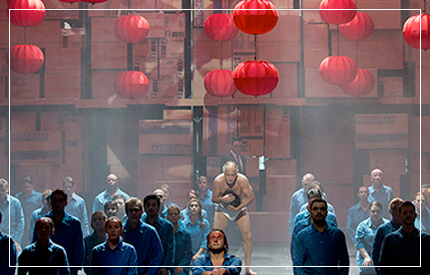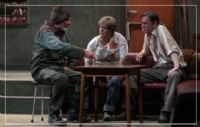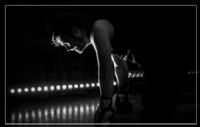Review: Turandot
Date: 02/11/2015
Theatre Review

From the damp, misty darkness of the dreary skies and bustling streets of Northern Ireland's capital city come a chattering and animated crowd, primed for the most unorthodox of takes on Giacomo Puccini's Turandot at Belfast's Grand Opera House.
In the hands of "the Quentin Tarantino of opera", Calixto Bieito, the audience will be showered with more damp mist as a procession to relentless darkness, punctuated by the slightest of comic interventions and highlighted by undeniably fascinating visuals and commendable performance. Commensurate in its craft but divisive in its vision, as stirring and compelling as it is shocking and disturbing, this Turandot is not so much black comedy as almost downright black.
Set in a communist era factory warehouse, where plastic baby dolls are manufactured by the workers, Bieito has sought to highlight the cruelty of the time through poverty, violence and emotional pain, also a means of depicting the most terrifying aspects of our present day society and the dissatisfaction that affected Puccini himself towards the end of his life.
The remarkable boldness, clarity and directness in Bieito's vision of Puccini's literally unfinished symphony - the composer did not live to complete it - is married with NI Opera and the Ulster Orchestra in such a way to leave the watchers in a state of either numbed shock, stunned admiration or both. A shock induced by the literal torture on show - beatings and whippings included - but an admiration that at least lends itself to everyone's performances, particularly those of the two central figures.
Neal Cooper goes through a collage of fearful emotions as Calaf; loneliness, loss, confusion, desperation and vulnerability are painstakingly projected in his features and vocals, in a manner emblematic of this production from a victim's point-of-view. Alongside him, Miriam Murphy's feisty dominatrix of a title character is a true powerhouse, successfully avoiding parody to create an intriguing and intimidating personality. Andrew Rees, Eamonn Mulhall and Paul Carey Jones all excel as Pang, Pong and Ping respectively, even briefly breaking from the edgy mood of the piece to raise some hearty chuckles in the crowd.
But one must emphasise the word "briefly". For generally, this Turandot's warehouse represents a world of constant oppression, condescension and torture, where every "worker" must use their inner and outer strength to survive. Where, with no interval to separate the three acts, both characters and audience face a ruthless, and near relentless, physical and musical assault on the senses for almost two hours.
What to make, then, of all this elaborate pain and pronounced suffering? Surely life, regardless of the difficulties many of us may face, was not supposed to be this suffocatingly bleak. Would Puccini, with the exception of a couple of laughs and the affecting sweetness of Anna Patalong's LiĂą, truly have appreciated Turandot like this? This feels like opera at its most nihilistic, an echo of the gritty, sadistic tendencies of late noughties Hollywood cinema but without sufficient heart.
The consequence of Bieito's admittedly physically and psychologically effective approach is that one never really feels the poetry, tragedy and grace in the work. There is a strange disconnect to the brutality and bravado - it is musically beautiful, heart-pounding but not heart-breaking. The price to pay, perhaps, for a Turandot seemingly centred more around intense perspiration than anything else.
"You're a kite dancing in a hurricane, Mr. Bond", speaks an important character in the latest James Bond film, Spectre. A line of dialogue which just about sums up how shaken, stirred and tossed around one may well feel by the spectre of this Turandot. Whether or not you view that as a good thing is up to you.
Simon Fallaha
In the hands of "the Quentin Tarantino of opera", Calixto Bieito, the audience will be showered with more damp mist as a procession to relentless darkness, punctuated by the slightest of comic interventions and highlighted by undeniably fascinating visuals and commendable performance. Commensurate in its craft but divisive in its vision, as stirring and compelling as it is shocking and disturbing, this Turandot is not so much black comedy as almost downright black.
Set in a communist era factory warehouse, where plastic baby dolls are manufactured by the workers, Bieito has sought to highlight the cruelty of the time through poverty, violence and emotional pain, also a means of depicting the most terrifying aspects of our present day society and the dissatisfaction that affected Puccini himself towards the end of his life.
The remarkable boldness, clarity and directness in Bieito's vision of Puccini's literally unfinished symphony - the composer did not live to complete it - is married with NI Opera and the Ulster Orchestra in such a way to leave the watchers in a state of either numbed shock, stunned admiration or both. A shock induced by the literal torture on show - beatings and whippings included - but an admiration that at least lends itself to everyone's performances, particularly those of the two central figures.
Neal Cooper goes through a collage of fearful emotions as Calaf; loneliness, loss, confusion, desperation and vulnerability are painstakingly projected in his features and vocals, in a manner emblematic of this production from a victim's point-of-view. Alongside him, Miriam Murphy's feisty dominatrix of a title character is a true powerhouse, successfully avoiding parody to create an intriguing and intimidating personality. Andrew Rees, Eamonn Mulhall and Paul Carey Jones all excel as Pang, Pong and Ping respectively, even briefly breaking from the edgy mood of the piece to raise some hearty chuckles in the crowd.
But one must emphasise the word "briefly". For generally, this Turandot's warehouse represents a world of constant oppression, condescension and torture, where every "worker" must use their inner and outer strength to survive. Where, with no interval to separate the three acts, both characters and audience face a ruthless, and near relentless, physical and musical assault on the senses for almost two hours.
What to make, then, of all this elaborate pain and pronounced suffering? Surely life, regardless of the difficulties many of us may face, was not supposed to be this suffocatingly bleak. Would Puccini, with the exception of a couple of laughs and the affecting sweetness of Anna Patalong's LiĂą, truly have appreciated Turandot like this? This feels like opera at its most nihilistic, an echo of the gritty, sadistic tendencies of late noughties Hollywood cinema but without sufficient heart.
The consequence of Bieito's admittedly physically and psychologically effective approach is that one never really feels the poetry, tragedy and grace in the work. There is a strange disconnect to the brutality and bravado - it is musically beautiful, heart-pounding but not heart-breaking. The price to pay, perhaps, for a Turandot seemingly centred more around intense perspiration than anything else.
"You're a kite dancing in a hurricane, Mr. Bond", speaks an important character in the latest James Bond film, Spectre. A line of dialogue which just about sums up how shaken, stirred and tossed around one may well feel by the spectre of this Turandot. Whether or not you view that as a good thing is up to you.
Simon Fallaha





































